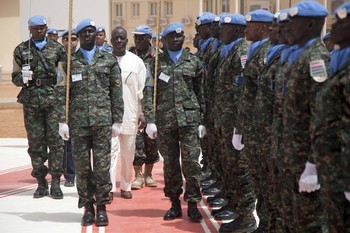AUPSC thanks Sudan at conclusion of Darfur field mission
March 21, 2013 (KHARTOUM) – The African Union Peace and Security Council (AUPSC) has expressed its “heartfelt gratitude” to the Sudanese government for its warm hospitality following the conclusion of its three-day field mission to examine new ideas for a peaceful resolution to the Darfur conflict.

“We came here seeking to further understand the dimensions of the conflict in Darfur and the challenges to the realisation of peace, and to find new ideas that would help in our pursuit to make a breakthrough in the conflict. In so doing, the AUPSC remains fully committed to respecting Sudan’s sovereignty, unity and territorial integrity”, the communique said.
The AUPSC commended countries that had contributed troops and police to the troubled region in western Sudan, as well as the efforts made by the men and women on the ground towards the achievement of lasting peace in Darfur, with particular tribute paid to those who had paid the ultimate sacrifice while serving in the area.
The AUPSC has reiterated its support for the Doha Document for Peace in Darfur (DDPD) – signed in July 2011 as the basis for any peaceful settlement, saying it also welcomed efforts to bring on board armed groups in Darfur that have not yet signed the DDPD.
The AUPSC also backed initiatives from the joint African Union-United Nations Mission in Darfur (UNAMID), including efforts to ensure diversification of its police component according to agreements under the tripartite mechanism, to increase the number of Arabic speaking officers from African countries in order to enhance interaction with the local population.
The mechanism brings together senior representatives of the Sudanese government, the African Union and the United Nations to reinforce cooperation and support for UNAMID.
In the communique, the AUPSC again underlined its commitment to a peaceful resolution on the conflict, urging the Sudanese government to continue its efforts aimed at relieving the humanitarian situation in Darfur, including enhanced protection for vulnerable groups, particularly women and children,”
“The AUPSC wishes to assure the government of the Republic of Sudan of its support to resolve the conflict in Darfur, to the best interest of the people of Darfur and indeed, to the interests of all the Sudanese people and Africa as a whole,” the statement said.
The AUPSC also welcomed a belated deal between the two Sudans reached on the 8 and 12 March on the implementation of border and security arrangements as previously agreed last September, saying it looked forward to “positive results” on the situation in Darfur.
The new agreement paves the way for the resumption of oil production which South Sudan shut down last January amid disagreements with its northern neighbour over transit fees to pump its oil via Sudanese pipelines to the Red Sea for export. The suspension caused severe economic downturn in both countries, which are heavily dependent on oil revenues.
The upbeat statement from the AUPSC comes as Darfur continues to experience a dramatic surge in tribal violence and lawlessness, leading to the largest displacement in years, with thousands fleeing their homes amid worsening instability.
Local media and activist organisations say banditry, killings, rape, bombings and kidnappings remain a harrowing mainstay of life for Darfurians, with aid groups struggling to meet humanitarian needs on the ground.
The latest surge in violence unfolded in January following clashes between members of the Arab Abbala and Beni Hussein tribes over control of lucrative gold mines in North Darfur’s Jebel Amir area.
In a statement issued by Oxfam earlier this year, the organisation said aid delivery was being severely hampered by restricted access to conflict-affected areas, under-funding and waning international interest in the devastated region.
(ST)
